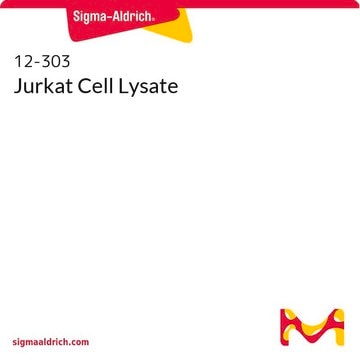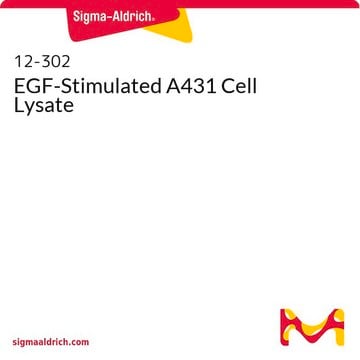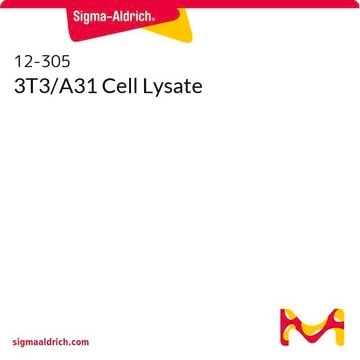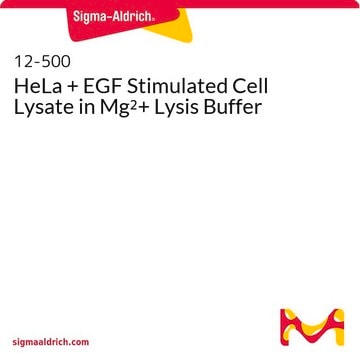Recommended Products
biological source
human
Quality Level
form
liquid
manufacturer/tradename
Upstate®
technique(s)
western blot: suitable
shipped in
dry ice
Cell Line Description
A431
Quality
Routinely evaluated as a positive control for several of Upstates antibodies.
Physical form
modified RIPA buffer (50mM Tris-HCl, pH 7.4, 1% NP40, 0.25% sodium deoxycholate, 150mM NaCl, 1mM EDTA, 1mM PMSF, 1μg/ml each of aprotinin, leupeptin, pepstatin, 1mM Na3VO4, 1mM NaF) and diluted with non-reducing sample buffer (31mM Tris-HCl, pH 6.8, 5% glycerol, 1% SDS, 0.002% bromphenol blue).
Storage and Stability
1 year at -20°C
Legal Information
UPSTATE is a registered trademark of Merck KGaA, Darmstadt, Germany
Disclaimer
Unless otherwise stated in our catalog or other company documentation accompanying the product(s), our products are intended for research use only and are not to be used for any other purpose, which includes but is not limited to, unauthorized commercial uses, in vitro diagnostic uses, ex vivo or in vivo therapeutic uses or any type of consumption or application to humans or animals.
Signal Word
Warning
Hazard Statements
Precautionary Statements
Hazard Classifications
Aquatic Chronic 3 - Eye Irrit. 2
Storage Class Code
12 - Non Combustible Liquids
WGK
WGK 3
Flash Point(F)
Not applicable
Flash Point(C)
Not applicable
Certificates of Analysis (COA)
Search for Certificates of Analysis (COA) by entering the products Lot/Batch Number. Lot and Batch Numbers can be found on a product’s label following the words ‘Lot’ or ‘Batch’.
Already Own This Product?
Find documentation for the products that you have recently purchased in the Document Library.
D J Flint et al.
Journal of molecular endocrinology, 36(3), 435-448 (2006-05-25)
Insulin-like growth factor-binding protein 5 (IGFBP-5) mediates involution of the mammary gland. The decrease in DNA content and mammary gland weight which accompanies involution was inhibited by prolactin (PRL) in wild-type but not transgenic mice expressing IGFBP-5. Phospho-STAT5 protein levels
Norikazu Yabuta et al.
Scientific reports, 8(1), 4892-4892 (2018-03-22)
p63, a transcriptional factor that belongs to the p53 family, regulates epidermal differentiation, stemness, cell death, tumorigenesis, metastasis, and senescence. However, its molecular mechanism remains elusive. We report here that TAp63 phosphorylated at T46/T281 specifically upregulates the late cornified envelope
Johannes Witt et al.
BMC systems biology, 3, 71-71 (2009-07-18)
Biological effects of nuclear factor-kappaB (NF kappaB) can differ tremendously depending on the cellular context. For example, NF kappaB induced by interleukin-1 (IL-1) is converted from an inhibitor of death receptor induced apoptosis into a promoter of ultraviolet-B radiation (UVB)-induced
Yu Shi et al.
Molecular and cellular biology, 23(21), 7732-7741 (2003-10-16)
MK5 (mitogen-activated protein kinase [MAPK]-activated protein kinase 5), also designated PRAK (p38-regulated and -activated kinase), was deleted from mice by homologous recombination. Although no MK5 full-length protein and kinase activity was detected in the MK5 knockout mice, the animals were
Xiaogang Jiang et al.
Aging cell, 2(1), 47-57 (2003-07-29)
The Shc family of proteins participates in mitogenic and survival signalling through binding to receptor tyrosine kinases. We report here on the expression of Shc in forebrain, spinal cord and hind limb muscles from 30-month-old rats with different degrees of
Our team of scientists has experience in all areas of research including Life Science, Material Science, Chemical Synthesis, Chromatography, Analytical and many others.
Contact Technical Service








